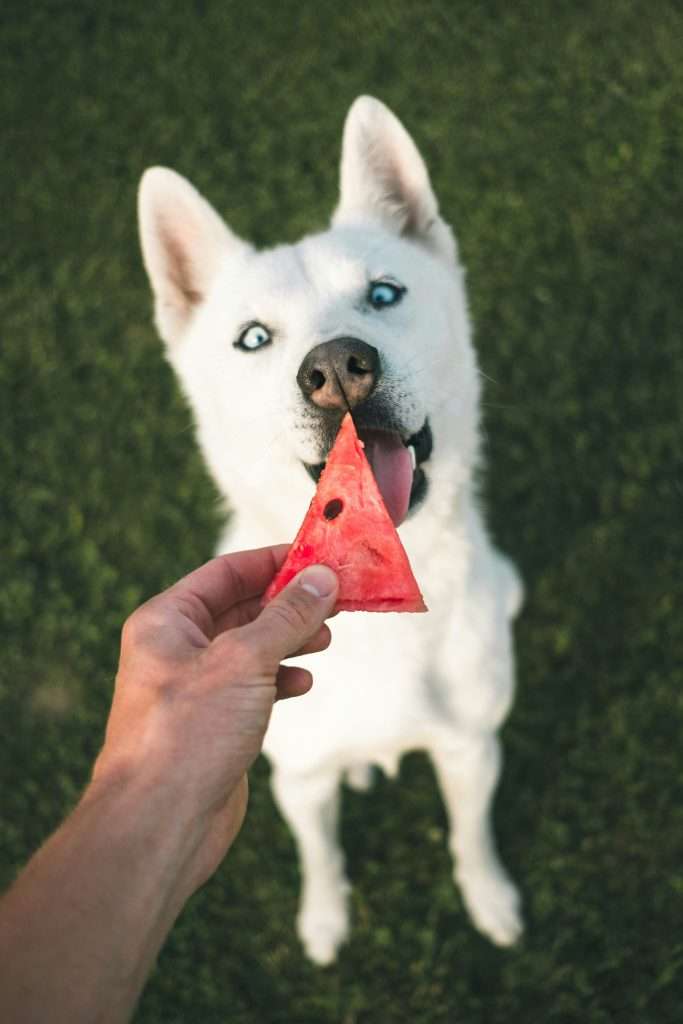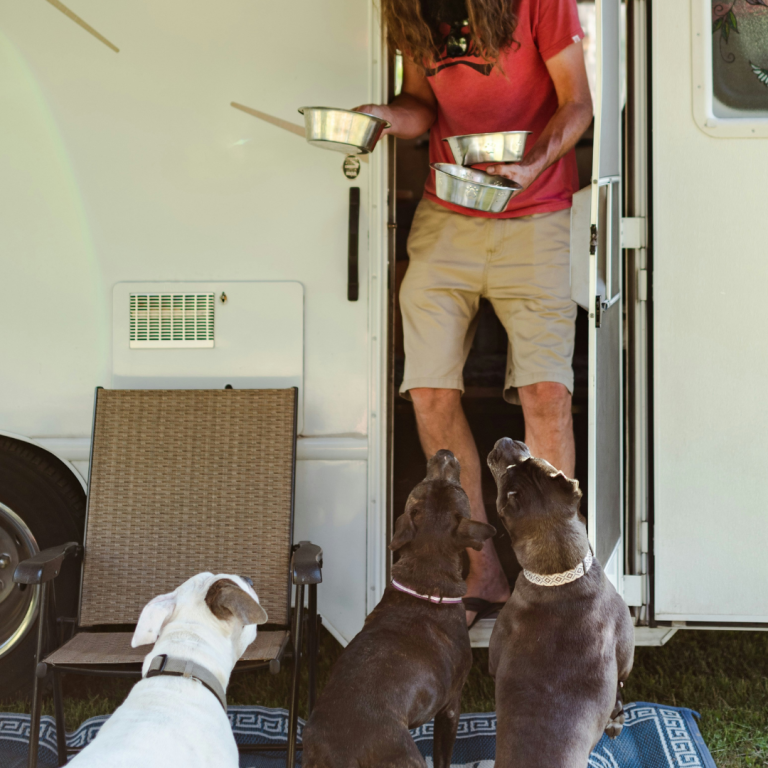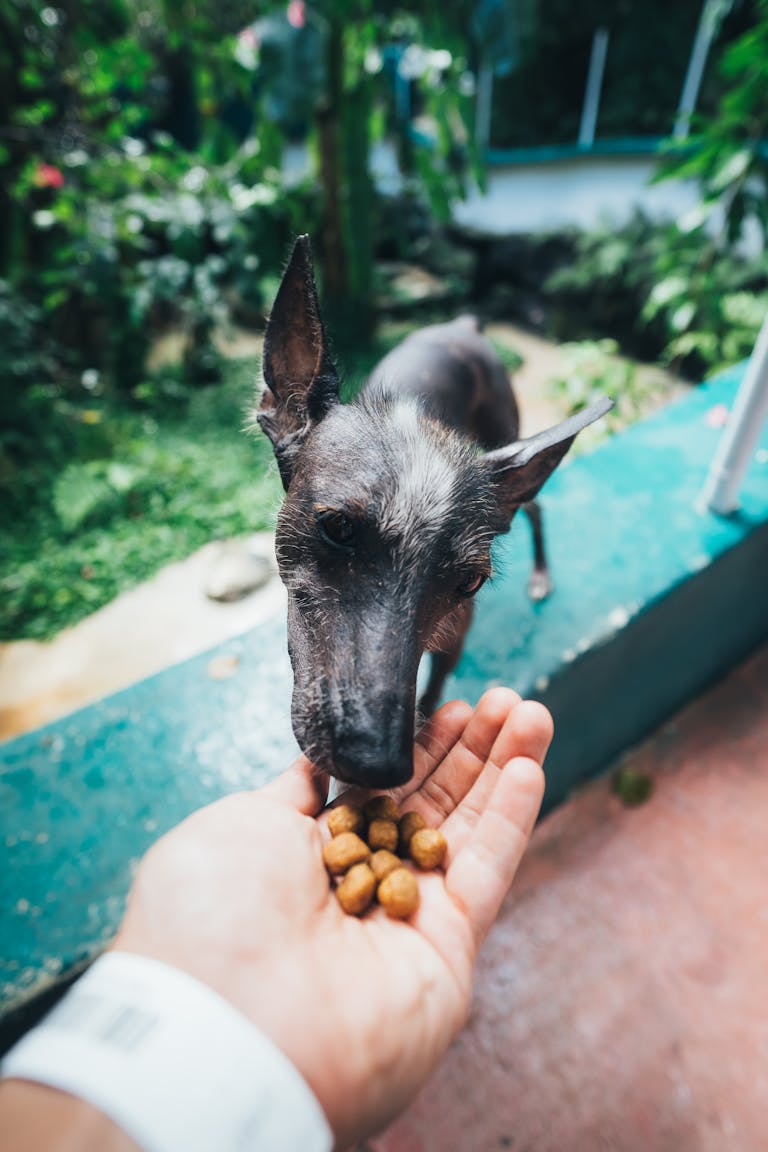Can Dogs Eat Watermelon? Tips, Facts, and Safety Advice

Can dogs eat watermelon? If you’re a dog owner, this question has probably crossed your mind, especially during those hot summer days. Yes, dogs can eat watermelon, but certain precautions are necessary. Many dogs love this juicy fruit, making it a refreshing treat for your furry friend. Ensuring it is served correctly is vital to keeping your pet happy and healthy.
When feeding watermelon to dogs, the seeds and rind must be removed. Seeds can cause intestinal blockages, and the rind may upset your dog’s stomach. The red, fleshy part of watermelon is safe for dogs and even offers some health benefits. It’s hydrating, low in calories, and packed with vitamins like A, B6, and C.
Watermelon is 92% water, so it can be a fun way to keep your dog hydrated. Always serve it in moderation and monitor your dog for any adverse reactions. This makes a tasty treat and helps maintain your dog’s health and well-being.
Table of Contents
Key Takeaways
- Dogs can eat watermelon but avoid seeds and rind.
- Watermelon provides hydration and essential vitamins.
- Serve it in moderation to prevent digestive issues.
Is Watermelon Safe for Dogs?
Dogs can safely eat watermelon with a few precautions. This section covers the health benefits of watermelon for dogs, its potential risks, and how it compares to other fruits.
Health Benefits of Watermelon
Watermelon is a refreshing treat, especially during hot weather. It contains 92% water, which helps keep dogs hydrated. This can be very beneficial, especially on hot days when pets are more likely to get dehydrated.
The fruit is low in calories, making it a healthy option for dogs needing low-calorie snacks. Watermelon is also packed with vitamins like vitamins A and C, which support dogs’ immune systems and contribute to maintaining healthy skin and eyesight.
In addition, watermelon contains other important nutrients, such as potassium and magnesium. These minerals help with various bodily functions, like muscle control and hydration levels.
Potential Risks and Precautions
Though watermelon is generally safe, some precautions must be taken. The seeds and rind can cause problems if ingested. Removing the seeds and rind before giving watermelon to dogs is essential. Seeds can cause intestinal blockage, while the rind can lead to gastrointestinal distress.
Dogs who are diabetic or have sugar sensitivities should avoid watermelon. The fruit has some natural sugars that could affect these conditions. Moderation is critical; too much watermelon can upset a dog’s stomach.
Veterinary opinions suggest being cautious. Experts recommend administering watermelon in moderation and removing potential hazards, like seeds and rinds.
Comparing Watermelon with Other Fruits
While watermelon is a great option, how does it compare to other fruits dogs can eat? Let’s look at a few examples:
- Apples are low in fat and provide vitamins A and C. Remove the seeds.
- Bananas are high in potassium and vitamins, which are a good treat, but they can also be high in sugar.
- Strawberries: Safe and packed with antioxidants and vitamins, but should be given in moderation.
- Blueberries: These are low in calories and high in antioxidants. They make an excellent treat for dogs.
- Cantaloupe: Similar to watermelon, cantaloupe is hydrating and packed with nutrients.
Grapes are toxic to dogs. Always introduce new fruit in small amounts to ensure your dog has no adverse reactions.
Nutritional Profile of Watermelon
Watermelon is a delicious and refreshing fruit many love, and it’s no wonder why! Here’s a breakdown of its nutritional content:
Calories: Watermelon is low in calories, making it a great snack. It has about 50 calories per cup. So, you can munch on it without worrying too much about your calorie intake.
Water Content: Did you know 92% of a watermelon is water? This makes it an excellent choice for hydration, especially on hot days.
Vitamins: Watermelon is packed with vitamins, including vitamins A, B6, and C. These vitamins support various body functions, including vision, immune health, and energy metabolism.
Minerals: Watermelon is a good source of potassium, which is essential for keeping your heart and muscles functioning correctly.
Sugar and Fiber: While watermelon does contain sugar, it’s natural sugar. It’s also a bit low in fiber, but the high water content helps with digestion.
Fat and Cholesterol: Good news! Watermelon contains no fat or cholesterol, making it a heart-healthy snack option.
Antioxidants: Watermelon is rich in antioxidants like lycopene, which are known for their potential health benefits, including reducing the risk of certain chronic diseases.
Here’s a quick table to summarize:
| Nutrient | Amount per Cup (150g) |
|---|---|
| Calories | 50 |
| Water Content | 92% |
| Vitamin A | 11% of RDA (Recommended Daily Allowance) |
| Vitamin B6 | 5% of RDA |
| Vitamin C | 21% of RDA |
| Potassium | 170 mg |
| Fiber | 0.6 g |
| Fat | 0 g |
| Cholesterol | 0 mg |
| Sugar | 9.4 g |
| Antioxidants | High in lycopene |
Eating watermelon can offer hydration and essential nutrients, making it a great snack for both humans and dogs, as long as you remove the seeds and rind. Visit the American Kennel Club or PetMD to learn more about how watermelon is safe and beneficial.
Proper Ways to Feed Watermelon to Dogs
When served correctly, watermelon is a healthy, hydrating treat for dogs. It’s low in calories, cholesterol-free, and packed with vitamins. Follow these guidelines to ensure your dog enjoys watermelon safely.
Serving Size and Frequency
Moderation is key when feeding watermelon to dogs. Although it is low in calories, contributing about 50 calories per cup, it should not replace their regular diet. Small dogs can have one or two bite-sized pieces daily, while larger dogs can enjoy a bit more but no more than one cup daily.
Excessive consumption can lead to digestive issues. Therefore, monitoring your dog’s overall calorie intake is crucial, especially if they are on a weight management plan. Remember, watermelon is a treat and not a meal replacement.
Preparation and Serving Suggestions
Proper preparation is essential to make watermelon a safe snack for your dog. Always choose seedless watermelon or remove all seeds, as they can cause intestinal blockage. The rind should also be discarded as it may lead to gastrointestinal upset. Wash the fruit thoroughly before cutting.
Once prepared, there are multiple fun serving options. Cut the watermelon into bite-sized pieces, making it easy for your dog to chew. You can freeze these pieces on a hot day for a refreshing treat. Another option is to puree the flesh and freeze it in ice cube trays for an icy snack.
Using these methods, you can safely incorporate watermelon into your dog’s diet, providing them with a delicious, hydrating, low-calorie treat. For further details, visit the American Kennel Club.
Common Concerns When Feeding Watermelon
Feeding watermelon to dogs can be beneficial, but being aware of potential issues is essential. Common concerns include allergic reactions, overconsumption, and ingesting seeds or rinds.
Allergic Reactions and Intolerance
While watermelon is generally safe, some dogs may be allergic or intolerant. Signs of an allergy can include vomiting, diarrhea, and itching. It’s a good idea to give your dog a small amount first and watch for these symptoms.
If you notice any distress, stop feeding it immediately. Although watermelon’s sodium and sugar content is low, it’s still wise to limit intake, especially in dogs with obesity or diabetes. Always consult a veterinarian for signs of an upset stomach or persistent allergic reactions.
What to Do in Case of Overconsumption
Overeating watermelon can lead to gastrointestinal upset. Symptoms like vomiting and diarrhea are common with overconsumption. Overeating might also increase the risk of an intestinal blockage, particularly if seeds or rind are ingested.
Watch for signs of distress or obstruction if your dog consumes watermelon rinds or many seeds. These include unwillingness to eat, lethargy, and unusual bowel movements. In such cases, seeking veterinary help promptly is essential to prevent complications.
Moderation and care in preparation can prevent most issues and make watermelon a safe treat for your dog.
Comparative Analysis of Dog-Safe Fruits
When considering the best fruits for dogs, knowing which ones are safe and which to avoid is crucial. This helps ensure your furry friend enjoys their treats without any health risks.
Fruits to Avoid
Some fruits can be harmful to dogs and should be avoided. Grapes and raisins are at the top of the list as they can cause kidney failure in dogs, even in small amounts. Avocados contain a toxin called persin that can lead to vomiting and diarrhea. Eating cherry pits can be dangerous, too; they contain cyanide and can cause choking.
Also, avoid letting dogs eat large amounts of pineapple due to its high acidity, which can cause stomach upset. Mango pits, like cherry pits, pose choking hazards. Apple seeds contain cyanogenic glycosides, which can release cyanide when chewed.
Safe Alternatives to Watermelon
If you want to switch things up from watermelon, several other dog-safe fruit alternatives exist. Strawberries are an excellent choice. They provide antioxidants, fiber, and vitamin C. Blueberries are another great option; they are rich in antioxidants, which help combat free radicals.
Apples (minus the seeds) offer vitamins A and C and are low in fat. Cucumbers are low in calories and can help keep your dog hydrated due to their high water content. Cantaloupe is another hydrating fruit that’s packed with vitamins.
Pumpkin can be a good source of fiber and aid in digestion. Bananas are a convenient option that is rich in potassium, but remember to give them in moderation as they contain a lot of sugar. Mix these fruits into your dog’s diet to keep them happy and healthy.
By knowing the safe options and ones to avoid, you can ensure your dog enjoys a variety of tasty and nutritious fruits.
Hydration and Watermelon as a Source
Watermelon can be a great way to help keep your dog hydrated, especially on hot days. This section explores the importance of hydration for dogs and how watermelon can be an effective hydrating snack.
The Importance of Keeping a Dog Hydrated
Proper hydration is crucial for dogs. It helps maintain their body temperature, supports digestion, and ensures that organs function effectively. Dehydration can lead to serious health problems. Signs of dehydration include dry gums, sunken eyes, and lethargy. Dogs may become dehydrated more quickly in hot weather or after exercise.
Always provide access to clean, fresh water to keep dogs hydrated. Some dogs might not drink enough water on their own, especially if they’re active or outdoors a lot.
Watermelon and Its Hydrating Qualities
Watermelon is 92% water, making it an excellent hydrating snack. In addition to its high water content, watermelon contains vitamins A, B6, and C, potassium, and magnesium. These nutrients can support a dog’s health and overall well-being.
To safely feed watermelon to dogs, permanently remove the rinds and seeds. The flesh can be cut into chunks or frozen as a cool treat on hot days. It’s low in calories, with about 50 calories per cup, and contains no fat or cholesterol. This makes it a guilt-free snack that helps keep dogs refreshed and hydrated.
FAQs on Dogs and Watermelon
Can dogs eat watermelon?
Yes, dogs can eat watermelon. If the seeds and rind are removed, it’s a tasty and safe treat for them. The flesh is 92% water, making it a hydrating snack.
Is watermelon good for dogs?
Watermelon has multiple benefits. It is low in calories and contains essential vitamins like A, B6, and C. It also has potassium and magnesium, which are suitable for dogs. Plus, since it’s mostly water, it helps keep dogs hydrated, especially on hot days.
Is watermelon safe for dogs?
Yes, watermelon is safe for dogs if prepared correctly. Permanently remove the seeds and rind. The seeds may cause intestinal blockage, and the rind can upset a dog’s stomach. Feeding the flesh in small amounts is safe.
How much watermelon can a dog eat?
Moderation is key. Too much watermelon can cause digestive issues like diarrhea. A good rule of thumb is to keep it as a treat and not a staple of their diet. For small dogs, one or two small chunks are enough. For larger breeds, a few more pieces can be given.
Can dogs eat watermelon rinds?
No, it’s best to avoid giving dogs watermelon rinds. The rind is hard to digest and can cause gastrointestinal issues. It might lead to stomach discomfort or even blockage. Permanently remove the rind before offering watermelon to dogs.
What if my dog eats watermelon seeds?
If a dog accidentally eats a few seeds, it might not be a big deal, but more than that can cause intestinal blockages. If you think your dog has eaten a lot of seeds, contact your veterinarian.
In summary, watermelon can be a delicious and healthy dog treats, but always serve it properly to ensure its safety. If you have any concerns, consult with a veterinarian for more advice.
Frequently Asked Questions
Dogs can enjoy watermelon as a treat, but it’s essential to know how to serve it properly and understand potential risks. Let’s explore common questions about feeding dogs watermelon.
Are the seeds of watermelon safe for my dog to chew on?
Watermelon seeds can cause issues for dogs. The seeds might lead to intestinal blockage, especially in smaller dogs. It’s best to feed your dog seedless watermelon or remove the seeds before giving it to them. Always double-check to ensure no seeds are left.
Is the watermelon rind considered harmful if my dog accidentally eats it?
The watermelon rind is not toxic, but it can be hard to digest and might cause gastrointestinal discomfort. Large pieces of rind can be a choking hazard or lead to an intestinal blockage. If your dog eats some rind, watch for any symptoms of digestive upset.
How often can I treat my dog with watermelon without risking their health?
Due to its sugar content, watermelon should be given to dogs in moderation. It is recommended that your dog be treated with watermelon once a week. Overfeeding can lead to digestive problems or weight gain. Limit the amount and frequency to keep your dog healthy.
Will watermelon provide my dog with hydration and essential nutrients?
Watermelon is 92% water, making it a great hydrating treat. It also contains vitamins A, B6, C, potassium, and magnesium. These nutrients can benefit your dog’s overall health. Just ensure it’s given in controlled amounts.
What quantity of watermelon is appropriate for my dog to consume
The quantity depends on your dog’s size. Small dogs can have 2-3 small pieces, while larger dogs can consume up to a cup of watermelon. To prevent any health issues, permanently remove the seeds and rind before serving.
How should I prepare watermelon to ensure it’s safe for my dog to eat?
To prepare watermelon for your dog, remove the rind and seeds. Cut the fruit into small, manageable pieces. For a fun twist, you can freeze the pieces for a cool summer treat. Always serve it in moderation and monitor your dog for any adverse reactions.







